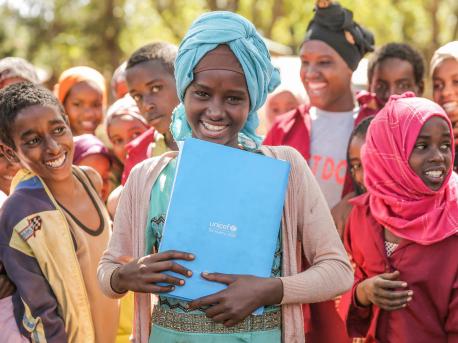
U.S. Government Support for UNICEF Grows
This week, federal lawmakers passed legislation to fund the U.S. Government for the 2020 fiscal year, including $134 million in core resources for UNICEF — the U.S. Government's highest contribution ever.
With the clock ticking down on 2019, Congress came together in a bipartisan fashion to determine funding for fiscal year 2020. The resulting appropriations bill, signed into law by President Trump, demonstrates strong support for the world's children including a $1.5 million increase to UNICEF's core resources. This uptick marks the first increase in the U.S. contribution to UNICEF in four years.
Congress authorized the first increase in the U.S. contribution to UNICEF in 4 years
The law for fiscal year 2020 signals Congress's continued support for the world's children in several other key ways.
For example, the law:
- Doubles the amount of funding to $2 million for The United States Agency for International Development (USAID) to fight maternal and neonatal tetanus (MNT), a cruel disease that is often fatal for newborns, yet entirely vaccine-preventable. Eliminating MNT has long been a priority of UNICEF and partner Kiwanis International
- Maintains $2.5 million in funding to address iodine deficiency disorders, another partnership goal of UNICEF and Kiwanis
- Increases financial assistance for the Global Health Programs account, which supports polio eradication, malaria and HIV/AIDS prevention and other bipartisan efforts that UNICEF has long championed
- Boosts support for other UNICEF priorities including an increase in funding to accounts on water, health and sanitation (WASH), nutrition, protecting vulnerable children, and responding to humanitarian crises.
The law also stipulates that $25 million be made available to Education Cannot Wait, the first global fund dedication to education in emergencies and protracted crises.
The U.S. Government's voluntary support is critical to UNICEF's work to save and improve children's lives
UNICEF receives no funding from the United Nations; program support depends entirely on voluntary contributions from governments, NGOs, foundations, corporations and private individuals. The contribution that UNICEF receives from the U.S. Government, while voluntary, is absolutely critical for UNICEF's daily work to deliver lifesaving aid to children around the world.
This legislation is a testament to Congress's faith in and support for UNICEF — and that doesn't happen by itself. It happens because of UNICEF's track record helping children; and it happens because UNICEF USA supporters across the country speak out #foreverychild, building relationships with their Congressional offices, reminding Members of Congress that their constituents believe in UNICEF.
Congratulations to all of us for convincing Congress to help UNICEF save and improve even more children's lives!
Top photo: UNICEF supports quality education programs for millions of children around the world, including these students at Shawe Primary School in Harana Buluk Woreda, Oromia Region, Ethiopia. © UNICEF/UN0278290/Mersh


